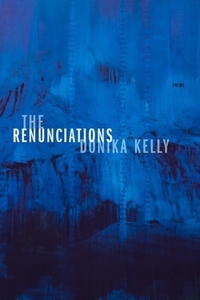Take a photo of a barcode or cover
The Renunciations is a powerful ode to resilience and drawing boundaries of the self while recovering from trauma. It’s heartbreaking, but also brings hope in the form of healing remembrance. Donika Kelly shows incredible vulnerability, vision, and sheer brilliance in this collection, and I will absolutely read more of her work.
Thanks to Netgalley and the publisher for the ARC in exchange for my honest review.
Thanks to Netgalley and the publisher for the ARC in exchange for my honest review.
dark
emotional
reflective
sad
fast-paced
Plot or Character Driven:
N/A
Strong character development:
N/A
Loveable characters:
N/A
Diverse cast of characters:
N/A
Flaws of characters a main focus:
N/A
challenging
dark
emotional
reflective
sad
medium-paced
challenging
dark
reflective
sad
medium-paced
Graphic: Child abuse, Rape, Sexual assault
Minor: Suicide attempt
emotional
"Came the thaw, came the melting snowpack, the flooded river, new ground water, the well risen. I stood in the mud field and called it a pasture. Stood with a needle in my mouth
and called it a song. Everything rushed past my small ears: the whir in the leaves, whir in the wing and the wood. About time to get a hammer, i thought. About time to get a nail and a saw".
I'm pretty picky with poetry, and the best of it I don't always follow. But this collection flowed, made sense to me, and I was horrified. Imagine you read a whole book of poems about being raped [ ] by her father, ignored by her mother, trying to fix herself, and about the things you can't say because of all this. and then to land here- getting a hammer for thawed land. I am beyond moved.
and called it a song. Everything rushed past my small ears: the whir in the leaves, whir in the wing and the wood. About time to get a hammer, i thought. About time to get a nail and a saw".
I'm pretty picky with poetry, and the best of it I don't always follow. But this collection flowed, made sense to me, and I was horrified. Imagine you read a whole book of poems about being raped [ ] by her father, ignored by her mother, trying to fix herself, and about the things you can't say because of all this. and then to land here- getting a hammer for thawed land. I am beyond moved.
I wasn't a huge fan on this book, which presents (what reads like) an autobio narrative about being sexually abused as a child by her father through the frame of mythology-- so there are references to Chronos and mazes with monsters in them, etc. There are these passing references to Greek myth, though, the book's symbolic language isn't quite as literal as that most times. Instead, there's a lot of personified water, shores, and trees-- elemental forces instead of particular ones, and maybe for me that wasn't interesting enough?
The poems come in a variety of forms-- there are blackout poems at the start of each section, and usually one at least that looks epistolary, etc. They are varied, though most feed back into excavating this narrative of abuse and trying to work through it. As a narrative arc, it is interesting-- instead of going chronologically, we are fed pieces but not seen the scenes of abuse till 2/3 of the way through the book, and the withholding is effective as narrative. I do think a lot of poets structure their books to tell a coherent story, but not many do what Kelly does here to make that structure work for effect.
The poems come in a variety of forms-- there are blackout poems at the start of each section, and usually one at least that looks epistolary, etc. They are varied, though most feed back into excavating this narrative of abuse and trying to work through it. As a narrative arc, it is interesting-- instead of going chronologically, we are fed pieces but not seen the scenes of abuse till 2/3 of the way through the book, and the withholding is effective as narrative. I do think a lot of poets structure their books to tell a coherent story, but not many do what Kelly does here to make that structure work for effect.
Donika Kelly is such a badass. If you're even reading this review, or considering this book, you likely know that. This book follows up on themes and issues she presents in BESTIARY, focusing more on her experiences being abused as a child and the difficult path of healing. The collection is elegantly structured, using liminality and formal constraints--gaps, erasures, absences, sonnets, etc.--to structure the pain and shame the speaker tries to release in this book, to create a container for what can't be contained. A beautiful, brave book.



